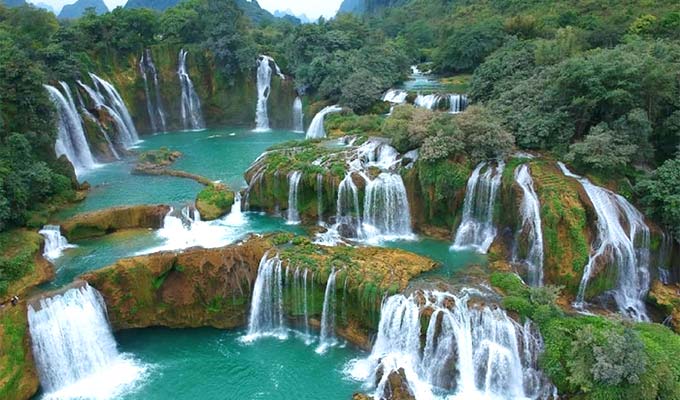A ceremony will be held on November 24 in Cao Bang city to receive a certificate from UNESCO recognising Non Nuoc Cao Bang Geopark the northern border province of Cao Bang as a global geopark by the UNESCO, a heard at a press conference in Ha Noi on November 6.

An aerial photo of Ban Gioc Waterfall
Non Nuoc Cao Bang is about 300km from Ha Noi capital city. It covers more than 3,000 sq.km. in the districts of Ha Quang, Tra Linh, Quang Uyen, Trung Khanh, Ha Lang and Phuc Hoa and part of Hoa An, Nguyen Binh and Thach An districts.
The geopark is home to fossils, ocean sediment, volcanic rocks, minerals, and especially karst landscapes, which can give researchers an insight into an over-500-million-year history of the Earth. It is also well known for rich biodiversity and many indigenous fauna and flora species.
According to the Cao Bang provincial Department of Culture, Sports and Tourism, the province will carry out three tourism routes in the geopark area so as to attract more tourists.
This is the second UNESCO-recognised Global Geopark in Viet Nam after Dong Van Karst Plateau, which was recognised in 2010.
Non Nuoc Cao Bang was established in 2015. In November 2016, Cao Bang submitted a dossier to UNESCO to seek the global geopark recognition. A survey team of UNESCO came to the province in July 2017 to make assessment of the park’s values and conservation work.
The certificate receiving ceremony will be broadcast live on Viet Nam Television channel VTV1. At the event, the province will announce the historical relic site on Border Victory in 1950 in Thach An district as a special national site.
The organising board also said a series of activities, including an investment, trade and tourism promotion conference, will take place in Cao Bang city from November 23 - 27 with the participation of nearly 400 delegates.